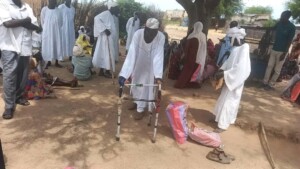11 cases of chikungunya confirmed in North Darfur
On Thursday, the Ministry of Health in North Darfur announced the emergence of 11 cases of chikungunya*, locally called kankasha, a mosquito-borne fever that can cause death.
 Lab assistant at the laboratory in El Sareif hospital, North Darfur (Albert González Farran / UNAMID)
Lab assistant at the laboratory in El Sareif hospital, North Darfur (Albert González Farran / UNAMID)
On Thursday, the Ministry of Health in North Darfur announced the emergence of 11 cases of chikungunya*, a mosquito-borne fever that can cause death.
The Director of the Health Ministry, Mujtaba El Tijani, said in a press statement on Thursday that five chikungunya cases were recorded in the state capital of El Fasher, three in Mellit, and three cases in El Koma.
El Tijani indicated that the current number of malaria patients in North Darfur is very high due to the intensive breeding of mosquitoes. Earlier this month, Radio Dabanga reported that the unusually heavy rainy season has made controlling the breeding of mosquitoes extra challenging.
This prompted the Ministry to send 22 suspected samples to the Central Laboratory in Khartoum to verify them. Yesterday, the results of the tests confirmed that 11 people were infected with chikungunya fever (locally called kankasha).
In September, ‘fevers accompanied by bleeding’ turned out to be chikungunya. Two years ago, dozens of people died in Kassala as a result of chikungunya infections. Last week, 41 cases of chikungunya were reported in West Darfur.
A State of Health Emergency was declared on October 5 in West Darfur in Sudan after 41 cases of chikungunya fever were confirmed, out of a total of 52 suspected cases. There is also a scarcity of medicines, medical supplies, and hospital capacity.
Medicine supplies running low
Sudan’s Central Pharmacists’ Committee warned of catastrophic effects due to an almost complete lack of essential, life-saving, and chronic disease drugs across the country last week.
The committee said in a statement on Wednesday that the crisis has exposed citizens’ health to great risks and complications in many cases.
The First Aid Hospital in El Geneina, West Darfur, is witnessing great overcrowding, a scarcity of medicine and treatment, and a shortage of medical staff and detention wards.
The Ministry of Health in West Darfur confirmed that the situation is out of control due to the scarcity and scarcity of medicines, medical supplies and hospitals that can accommodate the injured. It appealed to the federal Ministry of Health to intervene in order to save the situation in light of the scarcity of the pesticide that was developed for emergency cases.
Sudan has been suffering from a shortage of supplies since July, when the Pharmaceutical Professionals Alliance painted a bleak picture of the availability of medicines in the country.
*Chikungunya key facts (Source: WHO)
- Chikungunya is a viral disease transmitted to humans by infected mosquitoes. It causes fever and severe joint pain. Other symptoms include muscle pain, headache, nausea, fatigue and rash.
- Joint pain is often debilitating and can vary in duration.
- The disease shares some clinical signs with dengue and zika, and can be misdiagnosed in areas where they are common.
- There is no cure for the disease. Treatment is focused on relieving the symptoms.
- The proximity of mosquito breeding sites to human habitation is a significant risk factor for chikungunya.
- The disease mostly occurs in Africa, Asia and the Indian subcontinent. However a major outbreak in 2015 affected several countries of the Region of the Americas.
Chikungunya is a mosquito-borne viral disease first described during an outbreak in southern Tanzania in 1952. It is an RNA virus that belongs to the alphavirus genus of the family Togaviridae. The name “chikungunya” derives from a word in the Kimakonde language, meaning “to become contorted”, and describes the stooped appearance of sufferers with joint pain (arthralgia).
Radio Dabanga’s editorial independence means that we can continue to provide factual updates about political developments to Sudanese and international actors, educate people about how to avoid outbreaks of infectious diseases, and provide a window to the world for those in all corners of Sudan. Support Radio Dabanga for as little as €2.50, the equivalent of a cup of coffee.












 and then
and then